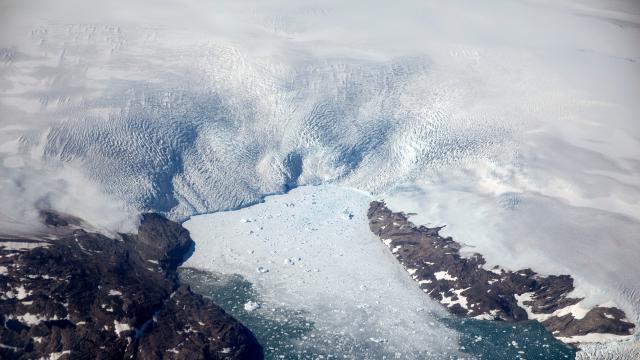A heat wave has shot up temperatures in Europe to new highs. Now, it’s set to continue moving north to Greenland. And that’s bad news for the ice sheets, the World Meteorological Organisation reports.
This dangerous heat — which brought temperatures close to 43C in parts of France — was caused by warm air entering the atmosphere from the Sahara and Spain. Now, the heat is expected to flow northward.
[referenced url=”https://gizmodo.com.au/2019/07/satellite-images-show-vast-swaths-of-the-arctic-on-fire/” thumb=”https://gizmodo.com.au/wp-content/uploads/2019/07/Screen-Shot-2019-07-19-at-10.37.53-am-410×231.png” title=”Satellite Images Show Vast Swaths Of The Arctic On Fire” excerpt=”Vast stretches of Earth’s northern latitudes are on fire right now. Hot weather has engulfed a huge portion of the Arctic, from Alaska to Greenland to Siberia. That’s helped create conditions ripe for wildfires, including some truly massive ones burning in remote parts of the region that are being seen by satellites.”]
This heat isn’t just a threat to the people who have to live through it. It’ll likely melt Arctic sea ice. And the Arctic doesn’t need any more heat: It’s warming more than two times faster than the rest of the planet, per the National Oceanic and Atmospheric Administration. There’s concern the melting could be as bad — or worse — than in 2012 when Arctic sea ice was the lowest in recorded history.
“This will result in high temperatures and consequently enhanced melting of the Greenland ice sheet,” said Clare Nullis, spokeswoman for the World Meteorological Organisation at a United Nations briefing this week, per Reuters.
Iceland just lost its first glacier. Alert, Canada, the northernmost inhabited place on Earth, hit 21C for the first time ever. The situation has grown so dire for the planet’s coldest (and quickly warming) places that scientists have proposed artificially creating snowfall to prevent at least one glacier from totally collapsing into the ocean, which would exacerbate sea level rise around the world.
If the poles melt, that’s bad news for all us coastal peeps. Our seas will rise by at least 20cm and could even shoot past 3m if we lose the West Antarctic glaciers, the most unstable. Every glacier counts, though, and this heat heading to Greenland is bad news.
